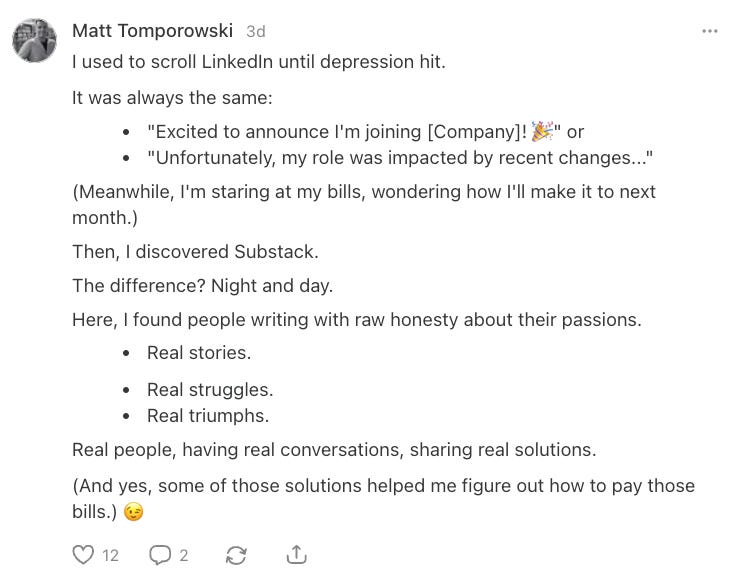Here's a hard truth: Most books sell fewer than 250 copies in their first year.
I know, I know. Your idea is different. Special. The next big thing.
But what if I told you there's a way to get data that will give you confidence that your book will succeed—before you spend months (or years) writing it?
I've published two books and learned this the hard way: Testing your book idea isn't just helpful—it's essential. After making every mistake in the book (pun intended), I've developed a simple system for validating book ideas before investing serious time into them.
The best part? You can do it all for free.
The 3-Step Reality Check Your Book Idea Needs
1. Find Your Testing Ground (Hint: You're Already On It)
Stop dreaming about writing a book for "everyone." You need real readers who'll give you real feedback—and Substack is your secret weapon.
Why Substack? Because it's crawling with people who actually read. Not just scroll. Not just skim. Read.
Sure, you could use Twitter, Instagram, or TikTok. But here's the thing: On those platforms, you're competing with dancing teenagers and viral cat videos. On Substack, you're among your people—readers and writers who care about good content.
Plus, Substack readers don't just consume—they engage. They comment. They share. They tell you exactly what works and what doesn't. It's like having a focus group at your fingertips.
2. Master the Art of the Micro-Test
Here's where I messed up with my first book: I dove straight into writing full chapters. Big mistake. Huge.
Instead, start with Substack’s notes—tiny, 100-word content bombs that test your ideas with minimal investment. Think of them as your book's minimum viable product.
Here's why this works:
It takes 20 minutes to write a note versus 5 hours for a chapter
You get instant feedback on your ideas
If an idea flops, you've lost minutes, not months
When something hits, you know exactly what resonates with your audience
Pro tip: Watch how people react. Likes are nice, but comments and restacks are gold. They show you've struck a nerve—in a good way.
Pro-Pro tip: To supercharge my note-writing, I became a founding member of
Substack: . I believe notes are a key ingredient in the secret sauce of success here on Substack, and Tom excels at writing notes. Here’s the first note that I wrote after joining The Writing Long Game and meeting with Tom:3. Turn Winners into Chapters
Only after your notes hit the mark should you expand them into full chapters. But here's the genius part: Share these chapters on Substack, too.
When I did this with my books, magic happened:
Readers caught typos and logic gaps before they made it to print
My Substack following grew
I built a loyal audience that later became my book's first buyers and reviewers
Every comment became a goldmine for future content ideas
The secret sauce? Don't just dump your chapters online. Create a conversation around them. Ask questions. Engage with comments. Let your readers inspire you.
The Brutal Truth About Book Success
Here's what nobody tells you: Even with all this testing, success isn't guaranteed. But this approach gives you something invaluable—data-driven direction.
You're not just writing in the dark anymore. You're building something with real audience feedback, growing a following, and creating content that's already proven to resonate.
And the best part? If your book idea doesn't catch fire, you'll know before you've invested a year of your life in it.
Your Next Move
Start small. Write one note about your book idea today. Share it. See what happens.
Remember: Every bestselling author started with a single page. The difference is, now you can test whether that page is worth turning into a book.
What's your book idea? Drop it in the comments—let's test it together.
Want more writing insights? Subscribe for weekly tips on turning your writing dreams into reality.







Book Idea: A creative nonfiction--memoir-like. In vignettes from the past, I unfold both the beauty of my childhood and the trauma of growing up in an alcoholic family in 1970s
Detroit. As I unearth family secrets that would threaten to pull anyone under, I grab hold to a faith that carries me to the shoreline.
Agree on the micro test approach, Matt! I'm writing every week for 6 years about one topic on LinkedIn. After 100 episodes I thought it's worth to collect them within a book. After 220 episodes it finally happened and my book "Connect & Act" came out - with a lot of feedback built in from those who engaged with that topic (and 33 contributors from testimonials to interviews). Collaboration is king!